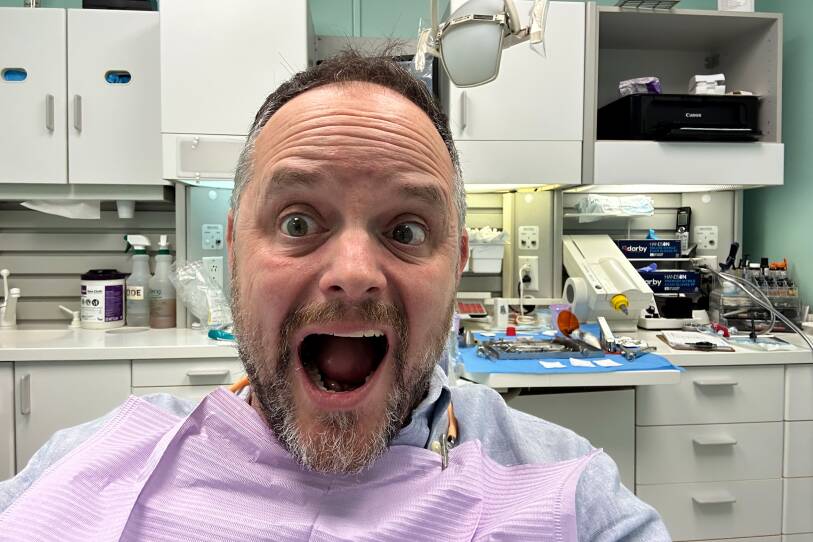Stress recently landed me in the dentist’s chair. And I’ve learned that I’m not alone.
To be clear, I don’t actually feel all that stressed out in my daily life. But apparently I’m working everything out in my sleep by grinding my teeth.
Recently, biting into a frozen cookie (a bad idea, I admit), I broke a molar. Before I could get a permanent crown, I broke a molar on the other side of my jaw. My dentist, Dr. Lina Al-Aswad, said she’d seen a lot of this recently.
“We’ve seen increased cases of fractured teeth due to stress and grinding,” she told me.
Research shows a correlation between the two, and that times of high stress can lead to increases in dental problems. A survey by the American Dental Association from March 2021 — the height of the pandemic — found 70% of dentists who responded saw an increase in teeth grinding and clenching.
I asked Dr. Al-Aswad if she remembered a spike back then.
“I’m actually seeing it more this year,” she told me. “I don’t know what’s going on but … the thing is, it takes some time. So people have been stressed for a couple of years and they’ve been grinding their teeth, and now the outcome of that is fracturing teeth.”

Dr. Al-Aswad’s experience piqued my curiosity, so I reached out to the Massachusetts Dental Society to see if there’s a bigger trend going on right now. And their president, Dr. Steven Spitz, thought it was a good question.
“So we were able to put together a survey and just asking dentists, ‘Is this something that you’re also noticing?’” Dr. Spitz said. “Because certainly in my practice I’ve been noticing many more people grinding their teeth.”
Over the last month, 140 Massachusetts dentists replied to the survey.
And sure enough, more than 75% of respondents said they’d seen an increase in teeth grinding or clenching in their patients. Nearly two-thirds of them said they’d seen an increase in chipped or cracked teeth. And almost half of the dentists said more of their patients are seeing jaw pain or temporomandibular (TMJ) joint symptoms.
“I think that stress is definitely at a higher level,” Dr. Spitz said. “The cost of living here in Massachusetts certainly has gone up. I think people are stressed out about financial reasons. People are stressed out about family issues.”
And it’s not surprising, Dr. Spitz said, that all that stress is taking its toll.
“We know that stress is held in our bite. And we know the mouth is the front door to our overall health,” he said.
Dr. Gabriela Lagreca, a prosthodontist and associate professor at Tufts University School of Dental Medicine, told me I basically got in a bad habit, subconsciously.
“Teeth are designed for chewing, for phonetics to be able to speak correctly. But they are not designed to be in contact with each other all the time,” she said.
And that grinding caused some tiny fractures in my teeth. The first sign of that was temperature sensitivity.
“It begins with cold, which is a good sign because that means that your nerve is alive and he’s feeling the sensation of the cold,” Dr. Lagreca said.
That may be a “good sign,” but it made ice cream excruciating. Of course I ate it anyway.
Dr. Lagreca said the more I grind my teeth, the more I exercise the masseter muscle in my jaw. That just made the problem get worse.
One possible treatment is — I kid you not — Botox injections.
“That’s something that we typically think about aesthetics and wrinkles, but we never think about the potential of using a neuromodulator to take a muscle that is enlarged and bring it back into proper size,” Dr. Lagreca said.
A simpler solution for many patients is wearing a mouth guard at night. Which, to be fair, is something Dr. Al-Aswad told me to get months ago. The custom ones cost hundreds of dollars, even with dental insurance. So I decided to get one at the pharmacy.
Which probably would have helped if I’d ever used it. I did own up to that with my dentist.
“Ideally, we want to have you wear a custom-made one, but because you’re kind of reluctant about the custom-made one right now, so I said try the one over the counter for the time being,” she told me.
I’m happy to report the mouth guard is working.
I think I’m going to pass on the Botox injections.
Produced with assistance from the Public Media Journalists Association Editor Corps funded by the Corporation for Public Broadcasting, a private corporation funded by the American people.





